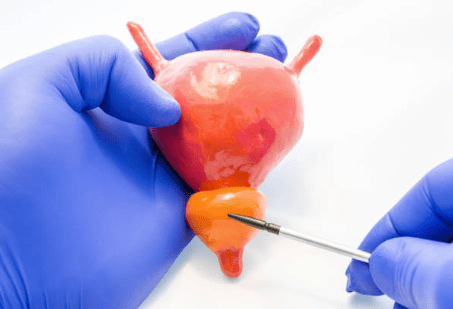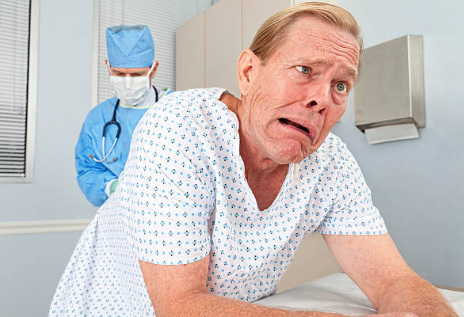Prostate Problems After 40? Get Urgent Answers Here

Prostate Problems After 40? You At Risk, and it’s Time to Face the Facts.
Men, let’s talk about something we often try to ignore – our prostates. That little gland can cause big problems as we get older. If you’re over 40, it’s time to pay attention.
Are You At Risk For Prostate Problems? It’s Time to Face the Facts
Guys, it’s easy to brush off those little changes as “just part of getting older.” But listen, that attitude can backfire when it comes to our prostates. That walnut-sized gland might be small, but it packs a punch – especially as those birthdays pile up. If you’re over 40, you’re in the zone. Time to stop pretending it won’t happen to you, and start listening to your body.
Warning Signs Your Prostate Needs Attention
-
The Peeing Struggle: Is your once-mighty stream now a pathetic dribble? Do you feel like there’s always a bit leftover, no matter how hard you try? That’s not normal aging, fellas. That’s your prostate sending you a message.
-
Bathroom Emergency: Remember when you could hold it ’til you found a decent rest stop? Now, the second you feel the urge, it’s a full-on panic. Your prostate might be to blame.
-
Sleep Wrecker: Is getting up 3…4…even 5 times a night to pee your new normal? Talk about exhausting. A troubled prostate can seriously mess with good sleep.
-
Ow! The Burn: Pain or burning when you pee? That’s a major red flag. It’s time to ditch the excuses and get yourself checked out.
This Isn’t a Joke, Guys
We tend to downplay these issues, even laugh them off. But ignoring them won’t make them go away. If left unchecked, prostate problems can steal your comfort, your freedom, and even your sleep. Don’t let it get that far.
Let me know if you want any other sections expanded or changed in style!
Don’t Panic! It Might NOT Be Cancer
These symptoms can be scary, but often it’s something called Benign Prostatic Hyperplasia (BPH). A fancy term for a very common, non-cancerous prostate enlargement.
So, What’s Going On Down There?
Imagine your prostate as a donut, and your urethra (the tube that carries pee) runs right through the hole. As the prostate gets bigger, it squeezes that tube. That’s why peeing becomes a struggle.
Why Does BPH Happen?
To be honest, doctors aren’t entirely sure. It seems to be a combo of aging and hormonal changes.
Could This Be Something More Serious?
Yes, sometimes similar symptoms can indicate prostate cancer or other issues. That’s why it’s CRUCIAL to see a doctor, especially if you also notice:
- Blood in your urine or semen
- Pain in your hips, back, or pelvis that doesn’t go away
What Can You Do About BPH?
Don’t worry, guys, there are options. Your best course of action depends on the severity of your symptoms and how much they’re impacting your life. Here’s a breakdown:
-
The Waiting Game: (BPH treatment) For mild symptoms, your doctor might recommend “watchful waiting” (also called “active surveillance”) with regular checkups. This means monitoring your situation without immediate treatment.
-
Lifestyle Changes: (natural remedies for BPH) Often, simple changes can make a big difference. Try cutting back on caffeine and alcohol, using timed bathroom breaks to retrain your bladder, and doing pelvic floor exercises (like Kegels) to strengthen the muscles involved.
-
Medication: (BPH medications) There are several medications that can help. Some relax the muscles of the prostate and bladder neck for easier urine flow, while others aim to shrink the prostate itself. Your doctor will help you choose the most suitable option.
-
Surgery: (BPH surgery) If your symptoms are severe and other treatments haven’t helped, various procedures are available. These range from minimally invasive techniques to traditional surgery. Don’t worry, your doctor will discuss all the pros and cons with you.
Don’t Let Prostate Problems Control Your Life
Think of this as taking charge of your own health. Knowledge is power. The sooner you address this, the better your chances of avoiding major disruptions down the road.
You’re Not Alone
BPH is super common – most men will experience it at some point. There’s no shame in talking to your doctor and finding the solution that works best for you.
Taking Action Is The Ultimate Power Move
Don’t ignore those bathroom changes. See your doctor, get the facts, and take back control of your comfort and well-being.
I hope this helps! Let me know if you’d like any adjustments to the style or content.

Prostate Problems FAQs: Get Your Questions Answered
1. I’m over 40. How do I know if my prostate is causing problems?
- Look out for frequent urination, weak urine flow, difficulty starting or stopping your flow, feeling like you can’t fully empty your bladder, and needing to get up multiple times a night to pee.
2. These symptoms sound scary. Could it be prostate cancer?
- While it’s important to rule out anything serious, the most common cause of these symptoms is a non-cancerous condition called BPH (Benign Prostatic Hyperplasia). Always get checked by a doctor to be sure.
3. What can I do about BPH if it’s mild?
- Your doctor may recommend “watchful waiting,” which means monitoring your symptoms. Simple lifestyle changes like reducing caffeine, timed bathroom breaks, and pelvic floor exercises can often help.
4. Are there medications that can help with BPH?
- Yes! There are medications designed to relax the prostate and bladder muscles, making urination easier. Others work to shrink the prostate gland itself. Your doctor will recommend the best option for you.
5. What if medication and lifestyle changes don’t work?
- For severe cases of BPH, there are minimally invasive procedures and traditional surgery options available. Your doctor will discuss these with you if other treatments aren’t effective.
Disclaimer:
The information provided in this article is intended for general knowledge and informational purposes only, and does not constitute medical advice. It is essential to consult a qualified healthcare professional for diagnosis and treatment of any health condition. Never disregard professional medical advice or delay in seeking it because of something you have read in this article.
